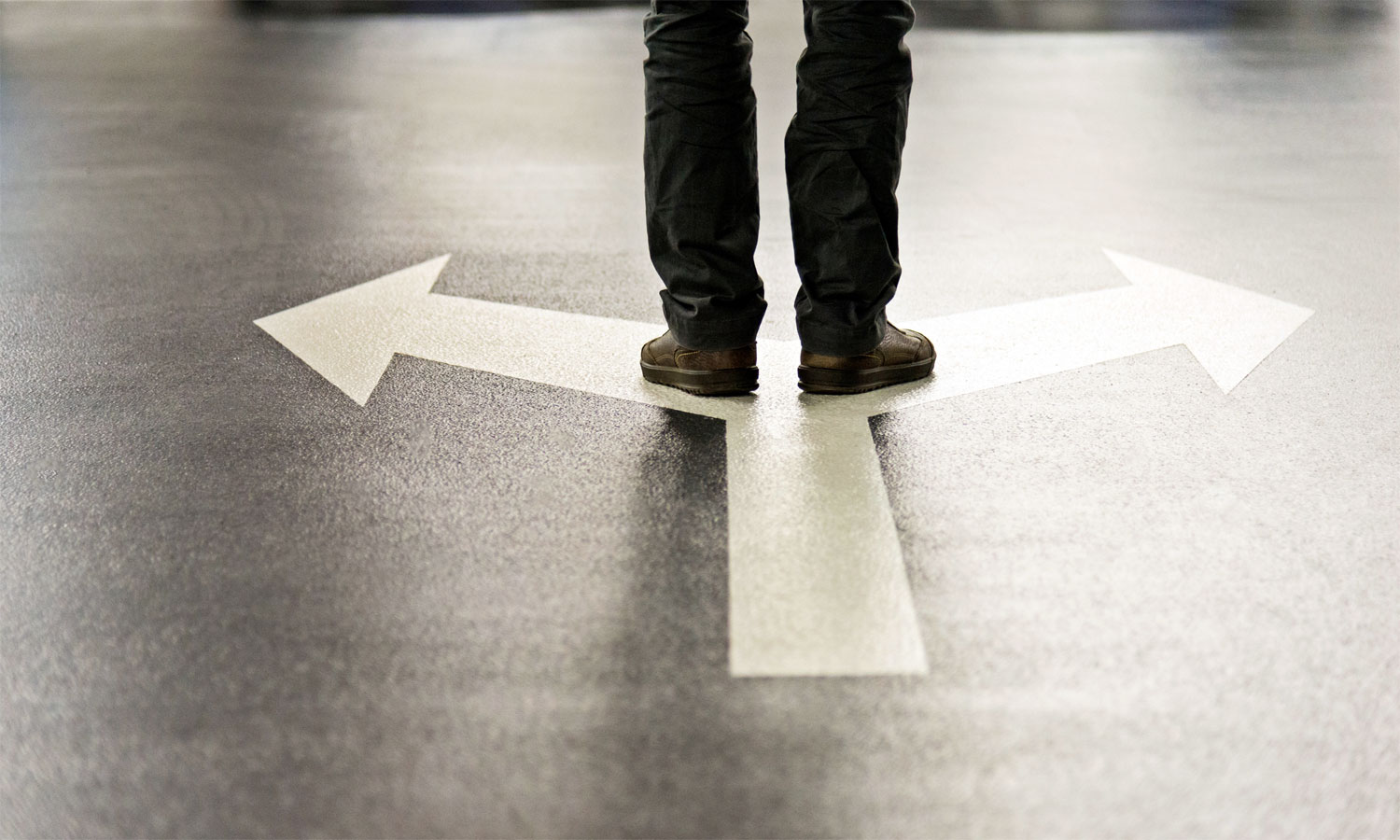3 Effective Ways To Stop Second-Guessing Yourself

“Good decisions come from experience, and experience comes from bad decisions.” – Unknown
You’ve made your decision, but wait! There it is again. That little voice inside your head says, “Are you sure this is the right choice?”
If you’re like me and have a knack for second-guessing yourself, you can easily slip into a frenzy of second-guessing even the simplest of decisions. But there’s a big problem with second-guessing yourself.
Repeatedly doubting yourself makes you lose control and feel anxious and insecure. It was just the motivation I needed to start figuring out how to stop second-guessing myself.
This article will explore how to stop second-guessing yourself and start trusting your decision-making skills, starting today.
Why are you second-guessing yourself?
Many people will second-guess themselves because they feel insecure or anxious about making the “wrong choice.” And the problem is not the choice itself but its perceived consequences.
We try to figure out the best option to lead us to happiness. It is natural to want the best outcome and avoid pain.
And second-guessing yourself sometimes isn’t a bad thing. What do I mean by that? Yes, occasionally second-guessing means we stop being more aware of a decision’s impact.
You know that moment when your friend tries on a dress and thinks, “Honestly, the dress makes your butt look big.” Taking a moment to assess whether you should say it out loud can save your friendship.
What are the consequences of second-guessing yourself?
For many people, the concept of second-guessing is familiar – it simply means criticizing specific actions after they have happened. Therefore, second-guessing yourself means criticizing and doubting yourself, your abilities, your strengths, and your decisions.
While this may seem like a minor hindrance to your decision-making, scientists would argue that it goes deeper than that. According to research, people who constantly doubt themselves are prone to various psychological problems, from mood swings and low self-esteem to anxiety and depression.
Research conducted in Berkeley also confirms this idea. These studies list indecisiveness, a tendency to change one’s mind quickly, and self-doubt as additional issues faced by self-doubters.
But if it can have so many negative consequences, why are people still second-guessing themselves? This result appears to be mainly due to the innate lack of confidence people experience when making decisions. This kind of uncertainty comes from a lack of confidence in whether your decision is correct or in your knowledge and skill set.
Behavioral researcher Joyce Ehrlinger calls second guessers “maximizers” and describes them as necessary to ensure they always make the right choice.
Thus, they are less inclined to make a complete decision. They are the type of people who get excited when they see a “final sale” sign because it makes them work. Because of fear of failure and commitment, “maximizers” are less happy in their daily lives.
3 Key ways to stop second-guessing yourself
second-guessing yourself So how can you stop doubting yourself in your everyday life?
1. Focus on yourself, not on others
Too often, we tend to put everyone else’s opinion front and center when making decisions in our daily lives. We forget our wants and needs. – Should I wear this shirt? What about these shoes?” These questions never leave our minds, even if we don’t think about them consciously. So how can we overcome this problem?
· Trust your gut
You’ve probably heard this advice so many times that, at this point, you’re on board with it. But let me share another point of view.
Scientists have discovered that the gut and the brain communicate with each other. This gut-brain connection allows the emotional experience to register as gastrointestinal distress. Anxiety, fear, and different feelings can make you experience stomach cramps and nausea. This is where the name “gut feeling” comes from. You feel it physically.
Research also proves that the brain is constantly making unconscious observations. He observes everything that you are not consciously aware of. If you’ve ever felt a sudden urge to cross a street and a brick falls from a building as you reach the other sidewalk, it’s no coincidence.
Your brain saw something you didn’t consciously register, maybe a few loose bricks, and told you to get to safety. These flashes of intuition are linked to specific brain processes, such as decoding non-standard cues.
So the next time you’re worried about that shirt to wear, feel free to trust your gut. It will tell you whether your gut instinct is based on past recorded data.
· Go easy on yourself
According to Dr. Christine Neff, University of Texas Department of Educational Psychology, going easy on yourself or self-compassion is recognizing that individuals share a common humanity. Compassion depends on accepting that all people are flawed and imperfect.
He says that people avoid self-compassion because they are afraid of being self-compassionate. Understanding that criticism is a way to increase motivation is detrimental to our well-being. Would you yell at a child who is having trouble at school? No. Just as we would not criticize others who need help, we should not criticize ourselves.
Instead, he says, self-compassion is the most critical catalyst for motivation. I congratulate you on your success. Treat yourself from time to time. Realize that you are only human and you should be kind to yourself as you are to others.
· Acceptance Risk-Taking
Taking risks doesn’t mean scuba diving with sharks. It means everything from cutting your hair in this style to always wanting to buy that expensive watch to more extreme pursuits if you get the job done.
It has to be a conscious decision to let go of inhibitions and push yourself out of your comfort zone. Maybe ask a more adventurous friend to convince you to do something a little crazy.
Research shows that positive brain chemicals respond to risk-taking, stimulating the development of neural networks that underpin our physical and mental abilities. Yes, taking risks can make you smarter!
By taking risks, you can slowly let go of inhibitions. Prove to yourself that you are more capable than you think. Gradually, you stop second-guessing yourself.
2. Prioritize learning
People second-guess themselves because they don’t trust their judgment and knowledge on specific topics. Therefore, it is necessary to increase self-confidence. Be open to learning more.
· Evaluate new information
In today’s context, it’s hard to know if your information is accurate or just fake news. Research suggests asking the following questions to learn new things and feel more confident:
When was the information posted? Does the information apply to me/current events? What is the source of my knowledge/ What are the author’s credentials? Does evidence or research support this information? What is the purpose of this information?
This may seem like a counterintuitive proposition: learn and do it precisely. But the more you know, the more confident you’ll be in your decision-making skills.
· Notice bad thoughts and replace them
Research shows that people need introspection to avoid self-doubt. UCLA Professor of Psychiatry Daniel Siegel, M.D., suggests mindfulness meditation as a tool to get your mind in a safe place for introspection. This benefit distinguishes between positive and negative thoughts without feeling guilty or self-critical.
Research shows that once you reach this safe place in your mind, take two simple steps: first, acknowledge the negative feeling or thought, label/name it, verbalize it, and second, transform the negative thought into something positive.
For example, if you are anxious about a specific date, acknowledge it and put it in words: “I’m afraid of this date.” Then repeat it: “Whatever the outcome, this date will be a new experience. From this date, I can learn about others, myself, and how relationships work.”
Introspection is the best way to learn about yourself and what you want and need. This will increase your self-confidence.
· Be sure of your values
When everything around you seems unstable, your only certainty is a spiritual compass. Your values, how do you decide what is moral or not? It’s who you are inside.
Finding your moral framework requires identify-consider-act-reflection: identifying and introspecting what your principles are for all kinds of situations, determining whether those principles are harmful or inappropriate to you and others, acting on those principles, and considering the consequences for you and others. You have to think about whether it makes others happy or not.
Values give you a better sense of self that will help you boost your self-esteem and stop doubting yourself.
3. Adopt a growth mindset
To stop second-guessing yourself, you need to remember that you are human. There is always room to grow. Instead of beating yourself up for your shortcomings, focus on improving yourself daily.
· Be comfortable with mistakes
We are not robots. We all have to make bad decisions in our life.
Research shows that to cope better with mistakes, you should try to see them as consequences rather than failures. Mistakes are experiences you can use to better handle the decisions you have to make later and get closer to the results you want.
Your value does not depend on your mistakes – you made mistakes, but you are not wrong! Being comfortable with errors shows that you are ready to grow.
· Rewire your brain for compassion
According to Jane Bolton (PsyD), people are hardwired to feel emotions. Thus, receiving and giving empathy fulfills a person’s need for communication and recognition, which allows for greater confidence in decision-making abilities.
Research shows that compassion reflects self-esteem. You tend to feel more confident when you understand others and protect your relationships.
Compassion not only helps others, but it also helps you grow and make better decisions.
· Ask for help
Second-guessing comes from the fear that people will reject you or help you when you need it.
But evidence suggests that those who previously rejected us are more likely to help out of compassion. According to Social Psychologist Heidi Grant, people tend to love us more for helping us.
So we get the advice we need when we doubt ourselves while asking for help. We have a chance to make new connections and make people love us.
Final thoughts on how to stop second-guessing yourself
While it’s okay to second-guess yourself occasionally, chronic second-guessing won’t lead to happiness. By practicing the skill of decisive and informed action, you can stop doubting your decisions.
While you may still fail from time to time, you can learn from those mistakes. Who knows, you might even silence that little doubting voice inside your head once and for all.
What do you think? Do you find it hard to stop second-guessing yourself? Or want to share another tip with our readers that have helped you personally? I’d love to hear from you in the comments below.












